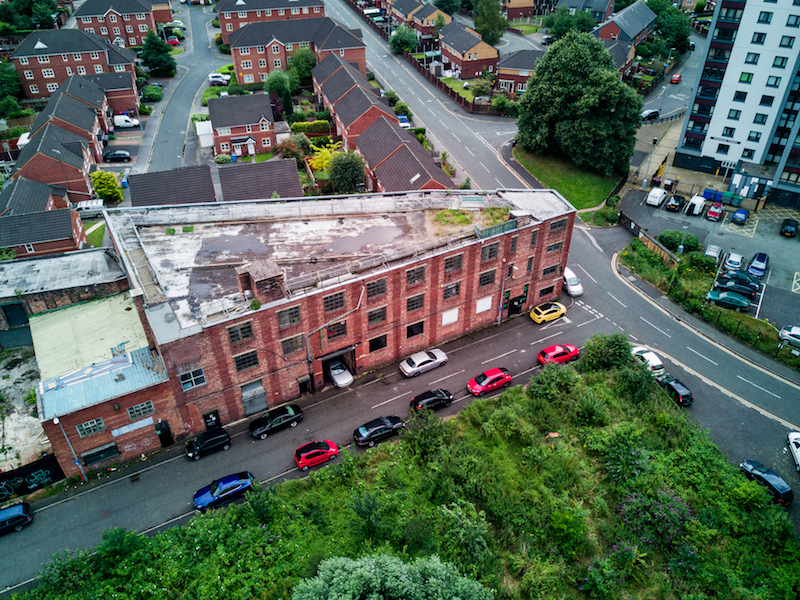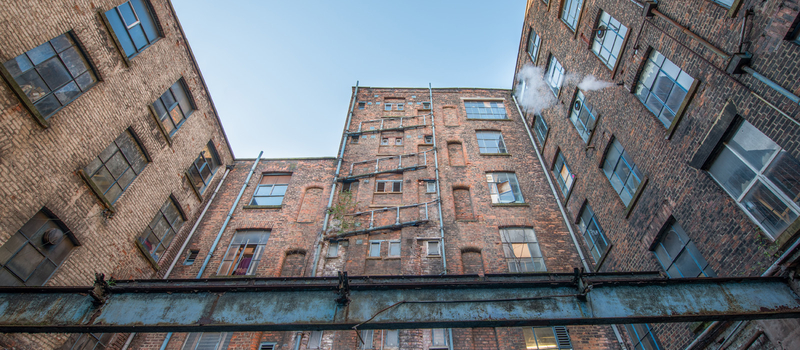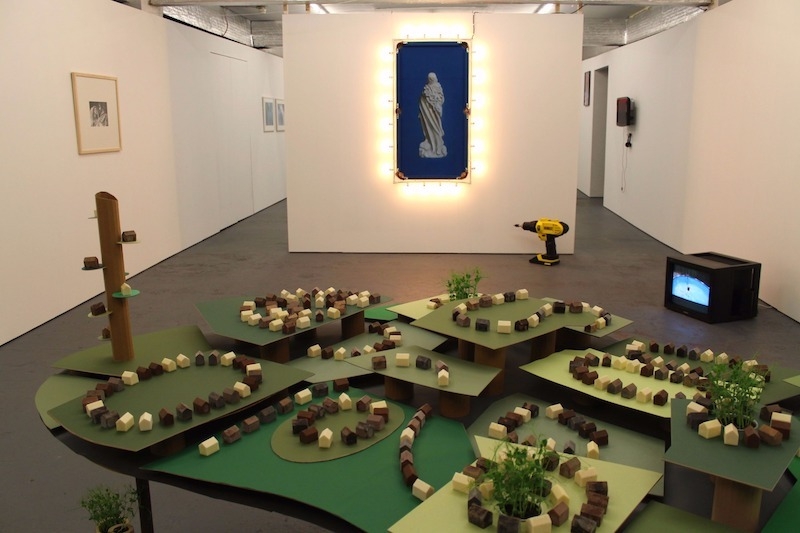As new artists' studio Paradise Works launches on the Manchester-Salford border, we discover an unlikely power struggle
The ‘Paradise’ Works building is situated behind the Renault Garage on Trinity Way, just past the Salford-Manchester border. Taking a wrong turn, I end up reaching it via a canal shortcut (which I probably won’t be taking again after sunset) and am let into the draughty old mill by resident artist Hilary Jack.
Previously used as storage, the mill’s upper two floors are now home to Paradise Works: an artist space spearheaded by Jack and her fellow artist Lucy Harvey. After coming to an agreement with owners Urban Splash, a local property developer that specialises in regeneration, they acquired use of the space in April and were able to create studios and an exhibition space with support from Arts Council England. Paradise Works officially launched last month, to coincide with The Manchester Contemporary art fair.
So what’s with the name?
“This road used to be called Paradise Row,” Jack tells me over a welcome hot cup of tea. “In those times, a lot of deprived areas were given aspirational names - Mount Pleasant and so on. That’s the origin of 'Paradise Works'.”
As for why 30 artists have come to inhabit a decaying mill on the banks of the River Irwell, it’s a long story - one that stems from a crisis in studio provision.
Jack used to be part of Rogue, the North West’s largest independent studio group, who occupied Crusader Works (a Grade II-listed mill complex behind Piccadilly Station) for over a decade. However, the building was sold to property developer Capital & Centric towards the end of 2015 and she was one of the 100 artists forced to find a new home (albeit not without a protest).

Recognising the value of Rogue to the city’s ecology, Manchester City Council found the group a new home. But for some artists - Jack included - the new location, a former school in Gorton, wasn’t suitable.
“A lot of my works are site-specific and I need to be close to the centre,” she tells me. “But there really is a shortage of artist space in Manchester. Places like the Hotspur Press building and NY Space used to be filled with artists but not anymore.
Most recently, queer art duo Rosanne Robertson and Debbie Sharp (otherwise known as Penthouse) were thrown out of their Hilton House premises after it was sold to oversees developers. They were in the middle of an Arts Council programme and had practically no time to find anywhere else.
“Fortunately, we had availability here, but the fact that our artists come from eight different places says a lot. And now we’re full to capacity.”
It was through a mixture of proactiveness and knowing the right people (plus a splash of luck) that Paradise Works came to be. The building was used for The Biospheric Project, a Manchester International Festival project, back in 2013 and that’s when Jack became aware of it.
“Following the news about Rogue, I was invited by Tom Bloxham (founder and CEO of Urban Splash) to discuss the crisis in artist studio provision, and asked him about the building. Tom has always been a big supporter of the arts and culture, and he offered us use of the space at a peppercorn rent.”

It’s undoubtedly philanthropic, but I can’t help thinking it’s a shame artists have to be so at the mercy of property developers; even culturally-sympathetic ones. And there’s another motive: gentrification.
So prevalent is the issue that a talk took place recently called ‘Artists’ Spaces and Gentrification - A Grand Alternative?’ Organised by occupiers of Phoenix Mill (ironically opposite Talbot Mill, another recently snapped up by Capital & Centric), the event blurb ran:
“Gentrification is fast becoming the most pressing issue for Manchester residents seeking affordable places to live, but how do artists factor into it? For those seeking secure studio space, the landscape is now largely dictated by property developers and their desire for cultural capital, rates subsidy and building security. It often seems that an artist’s only option is to work with these forces in return for temporary space, helping property speculators move into ‘undesirable’ areas whilst boosting their cultural kudos."
On the way to Paradise I notice that Urban Splash are building one of their new modular housing concepts near to Paradise Works. Does Jack think there may be another reason for their help, that of making the area appear more desirable? After all, it’s often the creative areas that end up being the ‘trendiest'.
She nods. “Yes, we’re not naïve in that respect, but I think we have to work together. Many artists are on precarious short-term leases, but Urban Splash have promised us a long term term future and support here."

In the longer term, however, she concedes, there needs to be a better cultural strategy in place. “I believe Salford City Council are developing one and we hope to be involved in these discussions.”
She goes on to say how a ‘cultural corridor’ has developed in Salford: Caustic Coastal, Hotbed Press, PAPER/Mirabel, Artwork Atelier and Islington Mill are all in close proximity, while Walk the Plank’s new home isn’t too far away.
Much of this she credits to Bill Campbell, who bought Islington Mill at the turn of century and transformed it into an artists’ hub whose influence has since radiated worldwide. But such purchases are rare and, for the time being, Jack is content with her new home - and with its artists, an intergenerational and proactive group spanning prestigious prize-winners to talented graduates.
Having launched with their debut exhibition, Politics of Paradise, Paradise Works will round off 2017 with two artist film screenings by HOME and Penthouse respectively. Next year will see an ambitious exhibition programme featuring a mixture of local, national and international artists - plus collaborations and guest curators.
"Ultimately, we want it be to sustainable," she says.
A quality that Manchester's studio scene, for the moment at least, is clearly lacking.
Find Paradise Works on East Philip Street, Salford M3 7LE















